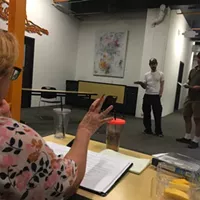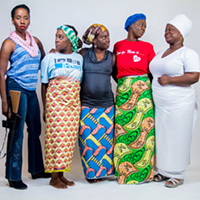Wednesday, March 23, 2011
Arts / News Theater review: Women of Will
Posted By Perry Tannenbaum on Wed, Mar 23, 2011 at 2:43 PM
Simplicity and an improvisatory spontaneity are the best qualities that writer-actress-teacher Tina Packer brings to Women of Will, a study of the feminine in Shakespeare’s work that is part lecture and part cavalcade of vignettes. Both parts are very good. Packer and her confederate, Nigel Gore, are very fine performers, bringing us excerpts from ten plays by the Bard, divided equally between the familiar and the unfamiliar. Thanks to Collaborative Arts, they do it at Duke Energy Theatre through this coming Sunday with a minimum of costumes, props, and scenery after some very deft set-up remarks.
We can sit back and ingest all this scene work so very comfortably because Packer and Gore deliver the blank verse so conversationally – and because Packer, past the age of 70, can still look glowingly up into the lights and convincingly become the 14-year-old Juliet right before our eyes. When we switch to the lecture portion, where Packer does most – but not all – of the talking, you might wish that you had brought a pen and notebook with you and that the arms of the seats had those cunning retractable desktops you remember from your college days. Because the overview that Packer and Gore deliver is fresh, fascinating, and provocative.
For centuries, orthodox bardolators have attributed the astounding variety of female characters in Shakespeare’s work to the fecundity of his imagination, the breadth of his experience, and the acuity of his powers of observation. Packer tosses aside the “vast tapestry” concept of Shakespeare’s achievement and proposes that the dramatist’s vision of women evolved over a 25-year span in five distinct stages. The women were different because Will himself had changed his attitude.
Although buttressed with tasty anecdotes, Packer’s theories force her to adopt a cocksure stance on the chronology of Shakespeare’s plays, one that may be exaggerating the time between the writing of Taming of the Shrew and Romeo and Juliet, representing the two phases of the Bard’s development presented before intermission. The gap between Macbeth and Pericles, presented as phases four and five after the break, may be even narrower.
Onstage in performance, the problems are few and far between. Packer’s feminist view of Katherine the Shrew in the climactic “blessed sun” confrontation certainly doesn’t enhance her intelligence, but the dumbed-down Petruchio given by Gore, bridling his bride as if she were an S&M slave, would result in the most odious Taming of the Shrew imaginable if sustained over the full course of the comedy. None of Packer’s ensuing characterizations comes anywhere close to such perversity, but when she decides to intercut scenes from As You Like It and Othello, Packer only succeeds in demonstrating what we already know: Rosalind and Desdemona are not the same.
In between, there is the magic of Joan of Arc from Henry VI, Part 1, and the luminosity of Juliet – already more than balancing the ledger. Afterwards there’s ambition and guilt in the spooky garb of Lady Macbeth, followed by one of the great reunion scenes of Shakespeare’s maturity, between Marina and her royal father in Pericles. We then skip to the last page of the last play Shakespeare wrote, Henry VIII, as the Archbishop of Canterbury blesses the most significant woman in the Bard’s world, the newborn Queen Elizabeth I – in terms that might have made Jesus blush.
Because the connective tissue between the scenes is more lecture than set-up, Packer trusts herself to deliver it all spontaneously like a lecture, leaning on Gore to fill in key details she may have omitted in her ramblings – or simply to offer his input. Subtly this very looseness keeps the teaching as live as the theatre.
At one point in Act 2, Gore descends from the balcony of Duke Energy to join his co-star onstage. It’s an action that’s possible at Shakespeare & Company, the theater Packer founded in Lenox, Massachusetts, 33 years ago. While pushing forward a three-story circular theater modeled after Shakespeare’s outdoor Rose Theatre, the company premiered Women of Will at Founders’ Theatre, an arena stage with two levels like the Duke but with a seating capacity closer to what we have at Booth Playhouse.
It was a telling reminder from these adept Shakespeare ambassadors that any old stepladder will do for scenery when fortified by passionate actors wrapping themselves in the language of the great comedies, tragedies, and histories. Maybe Collaborative Arts will take a cue from their distinguished guests and present one of their own future Shakespeare productions in the Duke’s courtyard setting.
Collaborative’s sixth Charlotte Shakespeare Festival returns to The Green Uptown on June 2 with – surprise! – a three-weekend run of Molière’s Tartuffe. They’re indoors at McGlohon Theatre with King Lear beginning on August 3. With folks like Packer and Gore to inspire the company, we can well believe there’s better Bard ahead for the Queen City.
Speaking of...
-

The Moffett Restaurant Group Celebrates the 20th Anniversary of Barrington’s Restaurant
Oct 12, 2020 -
Cancer's better with a side of 'shrooms
Aug 7, 2020 -

The Art of Influence
Aug 2, 2020 - More »










